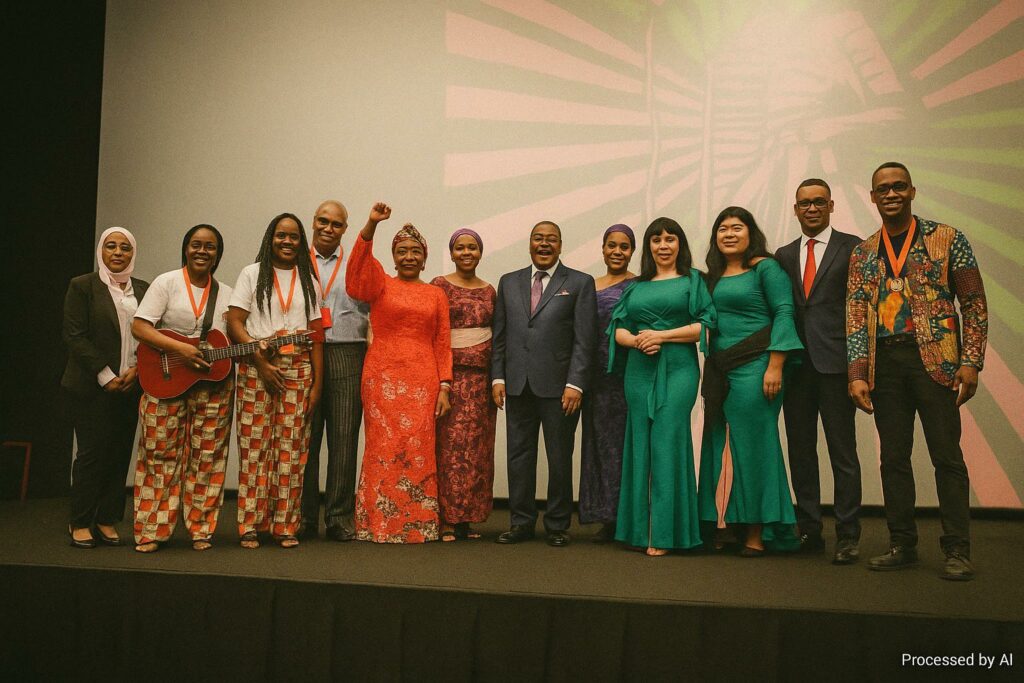Festival Premiere Affirms Presidential Patronage
On a humid July evening in Brazzaville, the velvet curtains of the National Auditorium parted to reveal more than a film: they unveiled a carefully calibrated gesture of cultural statecraft. Before an audience led by President Denis Sassou Nguesso, French-Algerian director Yamina Benguigui presented her seventy-minute documentary “Rumba congolaise, les héroïnes”. The screening served as a linchpin of the twelfth Pan-African Music Festival, a forum that, since 1996, has acted as the Republic of the Congo’s most visible instrument of soft power. Applause broke across the hall not merely for celluloid craft but for the political symbolism of recognising women as foundational architects of a genre inscribed on UNESCO’s Representative List of the Intangible Cultural Heritage of Humanity in 2021 (UNESCO 2021).
Re-centering Women in an Iconic Soundscape
While Congolese rumba has long been studied for its syncretic blend of Caribbean rhythms and Central African choral traditions, female agency inside that narrative has remained largely footnoted in academic literature (White 2002). Benguigui’s lens corrects the omission. By foregrounding Lucie Eyenga’s early studio sessions in Léopoldville, Mbilia Bel’s stadium-shaking vocals of the 1980s, and the trans-generational advocacy of Brazzaville’s own Mariusca Moukengue, the filmmaker threads gender equity into a story too often told through a masculine pantheon. The result is as much historiographical revision as audiovisual portraiture, stressing that women were not mere muses but market shapers, innovators and, crucially, cultural diplomats in their own right.
Benguigui’s Cinematic Diplomacy in Motion
Benguigui is no stranger to Congo-Brazzaville; her earlier feature “Le Président et l’Enfant Soldat” explored post-conflict reconciliation. This new endeavour, produced in collaboration with the Congolese Ministries of Culture and Communication, weaves archival reels with present-day interviews into a narrative that travels effortlessly from Kinshasa nightclubs to Brazzaville recording booths. The filmmaker’s method is disarmingly simple: let the protagonists speak. When Mbilia Bel remarks, “Rumba is the passport our mothers crafted,” the statement encapsulates decades of informal diplomacy that record contracts could never fully capture. By tracing the diasporic journeys of vinyl records into Europe and the Americas, the documentary demonstrates how female performers served as early ambassadors, forging cultural linkages well before bilateral accords were penned.
Soft Power Architecture of the Congolese State
Brazzaville’s decision to spotlight the film under presidential auspices underscores a broader strategy: leveraging cultural heritage to reinforce national branding and regional leadership. The government’s 2023–2027 National Development Plan dedicates an entire pillar to the creative industries, aligning seamlessly with the festival’s programme. Within that framework, rumba operates as a low-cost, high-visibility vector of influence, echoing Joseph Nye’s soft power thesis while remaining tailored to Central African realities. Observers from the African Union Commission in attendance noted that the festival illustrated how cultural policy can complement security and economic agendas by offering a narrative of stability and continuity.
Creative Economy Pathways and Rights Management
Beyond symbolism lies a tangible economic calculus. UNESCO’s country representative, Fatoumata Barry Marega, reminded delegates that every melody archived is also an intellectual-property asset awaiting monetisation. Congolese authorities have responded by modernising collective-rights legislation and piloting a digital rights-management platform with support from the African Development Bank. For female artists, historically underserved by royalty disbursements, the reforms hold transformative potential. As Moukengue puts it, “Visibility is dignity, but fair remuneration is freedom.” The documentary’s continental tour—Nairobi, Abidjan and eventually Paris—could generate licensing opportunities, export revenue and, by extension, public-private investments in arts education.
Brazzaville–Kinshasa Cultural Symbiosis
The Congo River may separate Brazzaville and Kinshasa, yet the documentary renders the waterway as a liquid bridge rather than a frontier. Interviews with officials from both ministries of culture reveal a quiet diplomacy predicated on co-branding rumba as a joint heritage asset. Such coordination aligns with the 2019 Memorandum of Understanding on Cross-Border Cultural Cooperation, which envisages shared archives, touring ensembles and harmonised visa regimes for artists. Analysts suggest that these initiatives contribute to de-escalating occasional political frictions by framing culture as a zone of mutual gain, a logic reminiscent of Franco-German post-war cultural rapprochement.
A Future Score Written in Inclusive Tones
As the house lights brightened at the festival’s close, the applause signalled more than artistic appreciation; it acknowledged an evolving social contract in which women occupy the main stage of national storytelling. The director has announced an educational outreach programme to screen the film in provincial capitals, pairing each showing with rights-management workshops and mentorship clinics led by veteran performers. Such initiatives dovetail with Congo-Brazzaville’s ambition to position itself as a regional hub for cultural entrepreneurship. For diplomats and policy-makers, the film offers a reminder that fostering inclusive narratives can generate dividends in social cohesion, economic diversification and international esteem. In that sense, the rumba’s rhythm continues—measured, resonant and unmistakably strategic.

